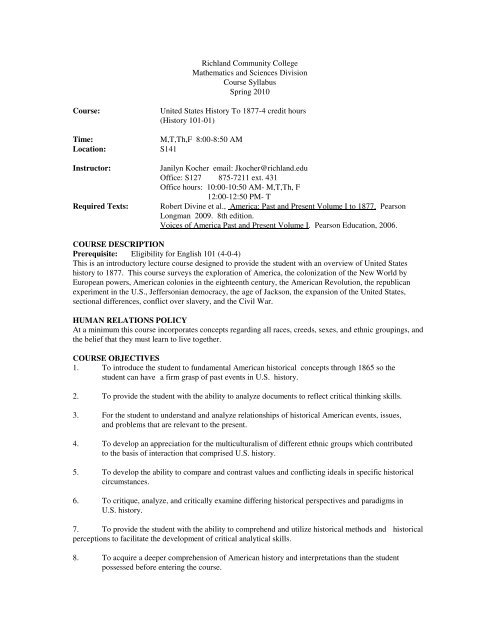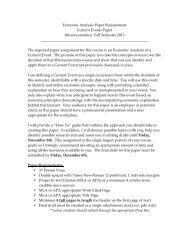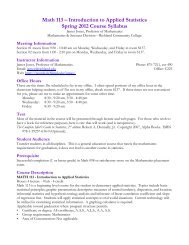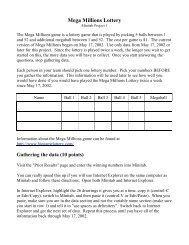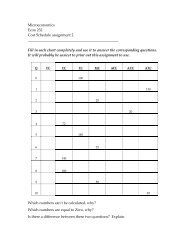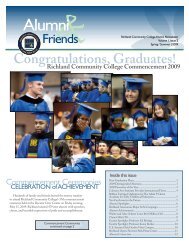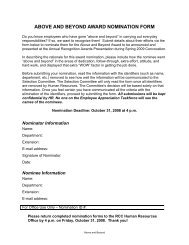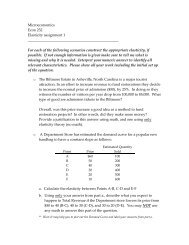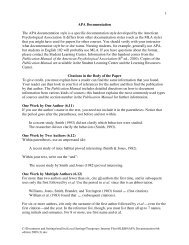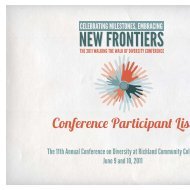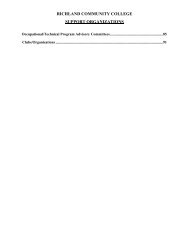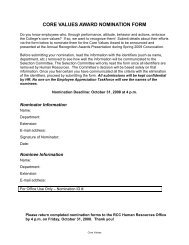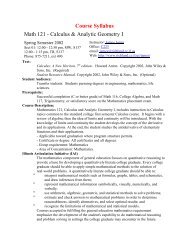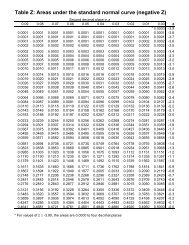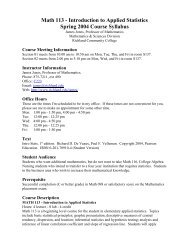Syllabus - Richland Community College
Syllabus - Richland Community College
Syllabus - Richland Community College
You also want an ePaper? Increase the reach of your titles
YUMPU automatically turns print PDFs into web optimized ePapers that Google loves.
<strong>Richland</strong> <strong>Community</strong> <strong>College</strong>Mathematics and Sciences DivisionCourse <strong>Syllabus</strong>Spring 2010Course:Time:Location:Instructor:Required Texts:United States History To 1877-4 credit hours(History 101-01)M,T,Th,F 8:00-8:50 AMS141Janilyn Kocher email: Jkocher@richland.eduOffice: S127 875-7211 ext. 431Office hours: 10:00-10:50 AM- M,T,Th, F12:00-12:50 PM- TRobert Divine et al., America: Past and Present Volume I to 1877. PearsonLongman 2009. 8th edition.Voices of America Past and Present Volume I. Pearson Education, 2006.COURSE DESCRIPTIONPrerequisite: Eligibility for English 101 (4-0-4)This is an introductory lecture course designed to provide the student with an overview of United Stateshistory to 1877. This course surveys the exploration of America, the colonization of the New World byEuropean powers, American colonies in the eighteenth century, the American Revolution, the republicanexperiment in the U.S., Jeffersonian democracy, the age of Jackson, the expansion of the United States,sectional differences, conflict over slavery, and the Civil War.HUMAN RELATIONS POLICYAt a minimum this course incorporates concepts regarding all races, creeds, sexes, and ethnic groupings, andthe belief that they must learn to live together.COURSE OBJECTIVES1. To introduce the student to fundamental American historical concepts through 1865 so thestudent can have a firm grasp of past events in U.S. history.2. To provide the student with the ability to analyze documents to reflect critical thinking skills.3. For the student to understand and analyze relationships of historical American events, issues,and problems that are relevant to the present.4. To develop an appreciation for the multiculturalism of different ethnic groups which contributedto the basis of interaction that comprised U.S. history.5. To develop the ability to compare and contrast values and conflicting ideals in specific historicalcircumstances.6. To critique, analyze, and critically examine differing historical perspectives and paradigms inU.S. history.7. To provide the student with the ability to comprehend and utilize historical methods and historicalperceptions to facilitate the development of critical analytical skills.8. To acquire a deeper comprehension of American history and interpretations than the studentpossessed before entering the course.
GENERAL EDUCATION GOALS1. The student's literacy and writing skills will be enhanced by this course through assignedreadings, class discussions, essay questions on the exams, and writing a book review.2. This course will help develop the student's analytical thinking capacities by applyingconvictions, perceptions, and interpretations to U.S. History as relayed throughwriting assignments and class participation.3. The student's creative thinking skills will be enhanced and refined by writing a critical analysisof a monograph in which the student will apply critiquing skills.4. The student will demonstrate an awareness of ethics and proper conduct by neither cheatingnor plagiarizing on examinations or book reviews. The response to student cheating shall be inaccordance with school policy with the following instructor options: A. No credit given forplagiarized classroom assignments and tests; B. Reduced credit given in the form of a lower gradefor plagiarized classroom assignments and exams; C. Instructor notifies the Division Chairperson;D. Cheating incidents of a serious nature may result in dropping the student from the course.COURSE REQUIREMENTSIn this class anticipate that you will have to work. Students are expected to come to class prepared and tohave completed the assigned reading for each class meeting. Students are also expected to pay attention tolectures as exams will be derived from both text and lectures. Students are also expected to participate inclass discussions. Each student is expected to attend class as attendance is very important and essential asscores on examinations often reflect classroom attendance. Your attendance promptly at the start of classis required. Your grade will suffer by not being present when class begins or excessive absences!Tardiness is not tolerated. When the classroom door is closed and I have begun talking, that is the startof class. If any student comes in after that time, then he/she will be considered late and 10 points will bededucted from the total class points available for every time this occurs.The instructor reserves the right to drop any student who has been absent 2 or more class sessions unless thestudent has contacted the instructor; the instructor also reserves the right to adjust final grades downwardbecause of excessive absences. Students are responsible for all material missed if they are absent or tardy.If at any time the instructor feels that a student is at risk of being unsuccessful in the course, the instructormay notify the Student Success Office. This office will in turn contact the student suggesting assistanceoptions.. Turn off all cell phones and pagers for the duration of the class. No cell phones are allowedin class during exams unless approved by the Dean of Mathematics and Sciences. NOTEXTING IN CLASS!!The Mathematics and Sciences Division prohibits the usage of cell phones, pagers and other nonlearning electronic devices within the classroom. All equipment must be turned off to avoiddisturbances to the learning environment. If a student uses these devices during an examination, quiz,or any grade activity, the instructor reserves the right to issue no credit for these assignments. Theinstructor needs to approve any exceptions to this policy.FACULTY ABSENCEStudents are advised that if no announcement of class cancellation has been posted on the classroom door,they should not leave for at least 15 minutes after the scheduled beginning time. If the instructor has notappeared, then call extension 386 from the classroom phone to see if the instructor has reported his/herabsence, or go to S119/S120 the Division office.
GRADING POLICYGrades will be determined by three (3) examinations, one book review, and internal/external classassignments. The exams will be composed of 25 multiple choice questions, 10 identification terms , and 4essay questions. Each exam will be worth 100 points. The final is not comprehensive as it will only covermaterial since the midterm. Grades for the exams will be assigned as follows: A=90-100; B=80-89; C=70-79; D=60-69; and F=59 or below. Exams are handed back, but are then picked up again. Students areexpected to take all exams when scheduled. Make up exams will only be allowed for legitimate reasons suchas an illness. Approved make up exams will be give at a time and place determined by the instructor outsideof scheduled class periods. ALL MAKE UP EXAMS ARE ESSAY. All make up exams MUST be takenwithin 7 days of the original test date. If a student misses the final exam, the instructor MUST be notifiedwithin 12 hours; failure to comply with this notification will result in a failing grade. The final exam willbegin promptly and students will be on time or they won’t be allowed to take the exam.All internal class assignments must be completed in class. If a student is absent on the day theassignments are completed, no EXCEPTION will be made. Any homework assignment the instructorassigns that is late (past the due date assigned by the instructor) will result in a 10 point reduction for everyday it is late, no matter how many points the assignment is worth!The book review is worth 50 points. Grades will be assigned as follows: A=50-45; B=44-40; C=39-35; D=34-30; and F=below 30. A sheet that outlines the components of a book review will be distributed.The book chosen has to be NON-FICTION and from the period of the course-1492-1865 and can be abouteither a person, place, or event in U.S. history. The book must be at least 100 pages in length, and must beapproved by the instructor. The review MUST be at least 3 pages in length and spelling WILL begraded. The review is due on APRIL 15 NO LATE PAPERS ARE ACCEPTED FOR ANY REASON.Your total grade for the course is computed by adding up all of your points and dividing that number by 500(total number of points possible), thus attaining your average on the 90,80 70 etc. scale. Final grading scale:500-450=A; 449-400=B; 399-350=C; 349-300=D; 299 or below=F.LEARNING ACCOMMODATION SERVICES<strong>Richland</strong> <strong>Community</strong> <strong>College</strong> offers support and accommodations to students withdocumented disabilities by providing advisement, counseling, adaptive equipment andmaterials, instructional aids, tutors, note-takers, interpreters, and testing accommodations,as well as many individualized services. For more information, contact the LearningAccommodation Services Office Room C142.COURSE OUTLINEWeek 1Jan. 14,15Week 2Jan. 18Jan. 19, 21,22Week 3Jan. 25,26,28,29Chapter 1: New World EncountersDocument 1.2 Questions 1-2, doc. 1.4 Q. 1-2; 1.5 Q. 1-2NO CLASS-MLK DayChapter 2: New World Experiments: England’s Seventeenth Century ColoniesDoc 2.1- Questions 1-2;2.4 Q. 1-2Chapter 3: Putting Down Roots: Opportunity and Oppression in ColonialSocietyDoc. 3.1 Quest. 1-2;3.2 Q. 102;3.3 Q. 1-2;3.5 Q. 1-2 and 3.6 Q. 1
Week 4Feb. 1,2,4,5Chapter 4: Experience of Empire: Eighteenth Century AmericaDoc. 4.1 Quest. 1-2; 4.3 Q. 1-2Week 5Feb. 8 EXAM I (Chapters 1-4)Feb. 9,11,12Chapter 5: The American Revolution: From Elite Protest to Popular Revolt,1763-1783Doc. 5.1 Quest. 1-2Week 6Feb. 15Feb. 16,18,19NO CLASS-PRESIDENTS’ DAYChapter 6: The Republican ExperimentDoc. 6.5 Quest. 1; 6.6 Q. 1Week 7Feb. 22,23,25,26 Chapter 7: Democracy in Distress: The Violence of Party Politics, 1788-1800Doc. 7.2 Quest. 1-2Week 8March 1 EXAM II (Chapters 5-7)March 2,4,5Chapter 8: Republican Ascendancy: The Jeffersonian VisionDoc. 8.1 Quest. 1; 8.3 Quest. 1-2Week 9March 8,9March 11, 12Chapter 9: Nation and Nation BuildingDoc. 9.1 Quest. 1-2; 9.2 Quest.1NO CLASS-SPRING BREAKWeek 10March 15,16,18,19Chapter 10: The Triumph of White Men’s DemocracyDoc. 10.2 Quest. 1-2; 10.5 Q. 1-2Week 11March 22,23,25,26Chapter 12: The Pursuit of PerfectionDoc. 12.2 Quest. 1; 12.3 Q. 1-2Week 12March 29,30, April 1April 2Chapter 13: An Age of ExpansionismDoc. 13.4 Quest. 1-2; 13.5 Q. 1NO CLASS
Week 13April 5,6,8,9Week 14April 12,13,15,16Week 15April 19,20,22,23Week 16April 26,27,29,30Week 17May 3,4,6,7Chapter 11: Slaves and MastersDoc. 11.1 Quest. 1-2;11.2 Q. 1-2Chapter 14: The Sectional CrisisDoc. 14.1 Quest. 1-2; 14.5 Q. 1BOOK REVIEWS DUE-APRIL 15Chapter 14 continuedChapter 15: Secession and the Civil WarDoc. 15.3 Quest. 1-2; 15.4 Q. 1Chapter 15 continued and reviewThe FINAL EXAM is scheduled for MONDAY, MAY 10 from 8:00-9:50 AM.(Chapters 8-15)This schedule is a tentative one that is subject to change due to general progression of the class orextenuating circumstances


